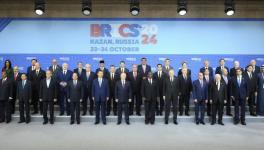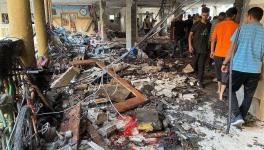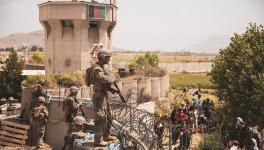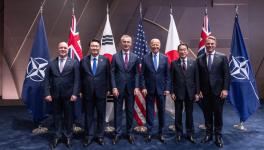Ukraine War: Why the West Cannot Afford to Ignore Afghanistan
The Taliban could look toward 'non-state actors' for financial help
The Taliban's return to power in Afghanistan was dubbed a monumental security challenge for the international community. A humanitarian crisis ensued, with millions of Afghans plunged into poverty, and the country's economy began to collapse.
Major world powers scrambled to tackle the situation, and efforts were made to ensure Afghanistan's stability and put pressure on the country's new Islamic fundamentalist rulers.
Seven months later, Afghanistan is no longer a main concern for Western powers, as they shift their focus to Russia's invasion of Ukraine.
Observers say the Taliban see it as an opportunity to implement their hard-line policies in the country, knowing that the international community is "busy elsewhere."
Regrouping of militants
Tamim Asey, the executive chairman of Kabul's Institute of War and Peace Studies and a visiting research fellow at King's College London, told DW that he believes "a lack of international interest" in Afghanistan's crisis could pave the way for terror groups and criminal networks to regather and regain strength.
"Unfortunately, Afghanistan has taken a backseat. This will push Afghanistan further into turmoil and will provide an opportunity for transnational criminal networks to recover," he told DW.
Few in the West see an immediate security threat emanating from Afghanistan. So far, the Taliban are seeking to gain international recognition and financial aid and have been more inclined toward a "diplomatic" approach than employing violent tactics.
But experts say this superficial calm may not last for long.
"History tells us that humanitarian crises could lead to violent conflicts. It is easier for terrorist groups to operate in a country that is facing economic turmoil. Afghanistan is no exception," Shamroz Khan Masjidi, an Afghan political analyst, told DW.
Aggravating humanitarian crisis
If the humanitarian crisis is aggravated in Afghanistan, even the Taliban won't be able to manage the situation, as evidenced by recent violent attacks by the Islamic State group.
Salahuddin Ludin, a political expert in Afghanistan, told DW that life has become "extremely difficult" for most Afghans.
"International aid organizations have left the country. The Taliban are unable to pay the wages to government employees. The public health care sector is in a disarray," he pointed out.
Apart from the suffering of the rural population, even Afghans based in cities are finding it impossible to make ends meet.
Ludin said many Afghans had put their savings in bank accounts: "Now, they cannot access them. Afghan businessmen, for instance, cannot make international transfers, which has resulted in high commodity prices in the country."
The Taliban have been demanding that the United States release Afghanistan's frozen assets so that they can tackle the worsening economic crisis. Washington has refused to hand over the money to them, which means that Afghanistan's Islamist rulers could look for "financial aid" from "non-state actors," say experts.
A forgotten crisis?
Sardar Mohammad Rahman Ughelli, Afghanistan's former ambassador to Ukraine, says the world is already "forgetting" about the Afghanistan crisis.
"Even the international media is not covering the crisis in Afghanistan," he said, adding that the Taliban are now free to implement their regressive policies in the country.
Some observers say the current situation is disturbingly similar to the geopolitical scenario in the late 1990s. The Taliban seized power in 1996, but the international community did not fully grasp the potential consequences of the new paradigm.
Away from the global spotlight — and with a lack of world interest in Afghan affairs — the country became a hub of local and international militant groups.
"The Taliban have ties with international terrorists. Their return to power has emboldened jihadi organizations in the region. As they consolidate themselves, their tactical and strategic ties with terrorism financiers and sponsors will grow and will eventually jeopardize peace and security in the region and beyond," Farid Amiri, a former Afghan government official, told DW.
Tariq Farhadi, an adviser to former Afghan President Ashraf Ghani, agrees with this view. "The international community forgot about Afghanistan from 1996 to 2001 during the Taliban's first regime. It is possible that it will be forgotten again," he added.
The longer the Taliban stay in power, Amiri said, the more difficult will it get to maintain stability in the region.
"Regional powers will start supporting proxies to keep the violence within Afghanistan's boundaries. But it will only be a short-term solution to the Afghan conflict," Amiri said.
Edited by: Srinivas Mazumdaru
Get the latest reports & analysis with people's perspective on Protests, movements & deep analytical videos, discussions of the current affairs in your Telegram app. Subscribe to NewsClick's Telegram channel & get Real-Time updates on stories, as they get published on our website.
























